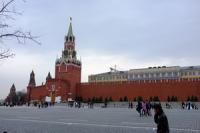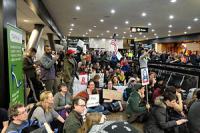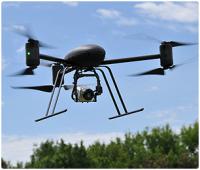-
New government terrorism report provides little useful information

The Departments of Homeland Security and Justice (DHS/DOJ) on Tuesday released a report on the threat of international terrorism. The new DHS/DOJ report produces little new information on immigration and terrorism and portrays some misleading and meaningless statistics as important findings. For example, since the beginning of 2002 through 2017, native-born Americans were responsible for 78 percent of all murders in terrorist attacks committed on U.S. soil while foreign-born terrorists only committed 22 percent. Including the actual number of deaths caused by terrorists flips the DHS/DOJ statistics on its head. Also: During 2002-2017, the chance of being murdered in a terrorist attack committed by a native-born American on U.S. soil was about one in 40.6 million per year. During the same period, the chance of being murdered by a foreign-born terrorist was about 145 million per year. The annual chance of being murdered in a non-terrorist homicide was about one in 19,325 per year, or about 1,641 times as great as being killed in any terrorist attack since 9/11.
-
-
Tracking and reacting to Russian attacks on democracy
Last week, a U.S. government report outlined attacks made by Russian President Vladimir Putin on democratic institutions over nearly two decades. The report details the many ways in which the Russian government has combined Soviet-era approaches with today’s technological tools. Princeton’s Jacob Shapiro says: “While not a revelation to people who have been following the issue, the depth and intensity of Russian efforts against America’s allies in Europe are striking and well-documented in the report. While some may argue that turnabout is fair play insofar as the United States and its European allies have been aggressively pushing their vision of governance inside Russia and its allies for decades, those efforts have taken place in the context of institutions that abide by widely accepted legal norms. What is striking about the Russian effort is the extent to which it employed actors and approaches that clearly and routinely transgress Russian, international, and domestic laws in the places they operate. To me, the extralegal nature of Russian influence efforts was just striking.”
-
-
Sahel region: New initiative to fight terrorism
Defense ministers from five countries in the Sahel region – the vast area immediately south of the Sahara Desert, extending from Senegal and Mauritania in the west to northern Ethiopia in the east – joined the French defense minister in a meeting in Paris in the latest push of joint antiterrorism force in the fragile region. “The joint force is gaining momentum… the first operation has taken place, the second one is starting today,” Malian Defense Minister Tiena Coulibaly told reporters.
-
-
Time for election reform
Congressional investigations have uncovered extensive interference - attempted fraud - by Russia and other foreign agents, including attempts to hack electronic voting machines, attempts to hack voter rolls to add or delete voters, targeted internet advertising, and targeted fake news and trolling. Here are five obvious reforms to strengthen the “critical infrastructure” of our democracy.
-
-
How to respond to Russia's attacks on democracy

Much of the public discourse concerning Russian interference has highlighted Russia’s use of disinformation to meddle in the U.S. elections, but the Kremlin’s activities extend beyond just interfering in elections. These activities encompass a comprehensive, asymmetric toolkit that exacerbates existing social divisions in Western societies, aiming to undermine democratic governments and institutions. Moscow, as a declining power, has opted for low-cost methods such as information warfare, hacking, political support for extremist groups, economic coercion, and illicit finance in an effort to undermine its perceived enemies in the West and create the perception that democracy is an inherently corrupt system.
-
-
Russia’s troll factory expands office to 12,000 square meters
Russian government disinformation and hacking specialists had good eighteen months: they were successful in their campaigns to bolster far-right, nationalist, anti-European political parties and leaders in France (Marine Le Pen), Germany (AfD), and the Netherlands (Geert Wilders); they were successful in raising the profile of populist causes which would weaken European institutions (Brexit, Catalonian independence, Scottish separatism, and Italy’s referendum); and they succeeded in helping Donald Trump, a polarizing, divisive leader who is more responsive to Russian interests and outlook, become president of the United States. Russia’s infamous troll factory in St. Petersburg, which played a major role in the Russian government’s disinformation campaigns on social media, is expanding its office to 12,000 square meters, three times bigger than its previous work space.
-
-
Trump’s “Muslim ban” produced rare shift in public opinion: Study

President Donald Trump signed Executive Order 13769 on 27 January 2017, effectively barring individuals from seven predominately Muslim countries from entering the United States for ninety days. Within a day of his decree, thousands of protesters flooded airports around the country in opposition to what was quickly deemed a “Muslim ban,” and by 6 March, the order had been formally revoked. Researchers say that the profound response to the ban represents “one instance in which the priming of American identity shifted citizens’ opinions toward more inclusive, rather than restrictive, immigration-related policy stances.” Overall, the findings suggest that American identity can be “primed” to produce shifts in public opinion. It also demonstrates that public opinion may be more malleable than previously thought.
-
-
The bonus effects of California's water saving
Measures to cut water use by 25 percent across California were implemented in 2015, following a four-year drought in the state that caused the fallowing of 542,000 acres of land, total economic costs of $2.74 billion, and the loss of approximately 21,000 jobs. The UC Davis researchers found that, while the 25 percent target had not quite been reached over the one-year period — with 524,000 million gallons of water saved — the measures’ impact had positive knock-on effects for other environmental objectives, leading to substantial reductions in greenhouse gas (GHG) emissions and electricity consumption in the state.
-
-
Russian hackers who hacked DNC are now targeting U.S. Senate: Experts
Russian hackers from the group known as “Fancy Bear” are targeting the U.S. Senate with a new espionage campaign, according to cybersecurity firm TrendMicro. Fancy Bear was one of the Russian government’s hacking groups employed by the Kremlin in 2016 to help Donald Trump win the presidency, and TrendMicro analysts say the group has spent the past few months laying the groundwork for an espionage campaign against the U.S. Senate. Analysts say that the group’s efforts to gather the emails of America’s political elite suggest that the Kremlin plans to continue to interfere in the American political process.
-
-
Balloon-borne infrasound sensor array detects explosions
Infrasound is sound of very low frequencies, below 20 hertz, which is lower than humans can hear. African elephants produce infrasound for long-distance communication at around 15 hertz. For comparison, a bumblebee’s buzz is typically 150 hertz and humans hear in the range of 20 to 20,000 hertz. Infrasound is important because it’s one of the verification technologies the U.S. and the international community use to monitor explosions, including those caused by nuclear tests. Traditionally, infrasound is detected by ground-based sensor arrays, which don’t cover the open ocean and can be muddled by other noises, such as the wind. Sandia Lab scientists is using sheets of plastic, packing tape, some string, a little charcoal dust, and a white shoebox-size box to build a solar-powered hot air balloon for detecting infrasound.
-
-
Detect illicit drone video filming

Researchers have demonstrated the first technique to detect a drone camera illicitly capturing video. Their study addresses increasing concerns about the proliferation of drone use for personal and business applications and how it is impinging on privacy and safety.
-
-
Report details two decades of Putin’s attacks on democracy, U.S. vulnerability to Kremlin's interference
A Senate Foreign Relations Committee Democratic staff report released Wednesday details Russian president Vladimir Putin’s nearly two decades-long assault on democratic institutions, universal values, and the rule of law across Europe and in his own country. The report finds that President Trump’s refusal to publicly acknowledge the threat posed by the Russian government has hampered efforts to mobilize the U.S. government, strengthen U.S. institutions, and work with U.S. European allies to counter Putin’s interference in democracies abroad. In the absence of unequivocal presidential leadership, the United States remains vulnerable to Russian interference. The report includes more than thirty recommendations for the United States and its allies.
-
-
Sputnik partner “required to register” under U.S. Foreign-Agent law
State-supported Russian media outlet Sputnik says its U.S.-based partner company RIA Global LLC has been ordered to register as a foreign agent by the U.S. government. According to Sputnik, the Justice Department said that RIA Global produces content on behalf of state media company Rossiya Segodnya and thus on behalf of the Russian government.
-
-
Smart sensor could revolutionize crime, terrorism prevention
Crime, terrorism prevention, environmental monitoring, reusable electronics, medical diagnostics and food safety, are just a few of the far-reaching areas where a new chemical sensor could revolutionize progress. Engineers at the University of Oxford have used material compounds, known as Metal Organic Frameworks (MOFs), to develop technology that senses and responds to light and chemicals. The material visibly changes color depending on the substance detected.
-
-
Russia’s Europe meddling; 2018 election security plan; Russia hacks Winter Olympics, and more
· Intelligence Committee prepares election security plan to thwart Russian hacking
· Everything we know so far about Russian election meddling in Europe
· Congress’ grilling of tech companies in 2017 foreshadows the debates of 2018
· Why is WikiLeaks trying to kneecap Michael Wolff’s book?
· The digger who commissioned the Trump-Russia dossier
· Czechs fear Russian fake news in presidential election
· We are being defeated in a digital war – but there is still time to fight back
· Sneaky malware disguises itself as an Adobe Flash Player installer
· Fancy Bear: Alleged Russian hackers leak ‘emails and documents’ from Olympic body
· Republicans work to frustrate Mueller’s Russia investigation as probes close in on Trump White House
-